Photo
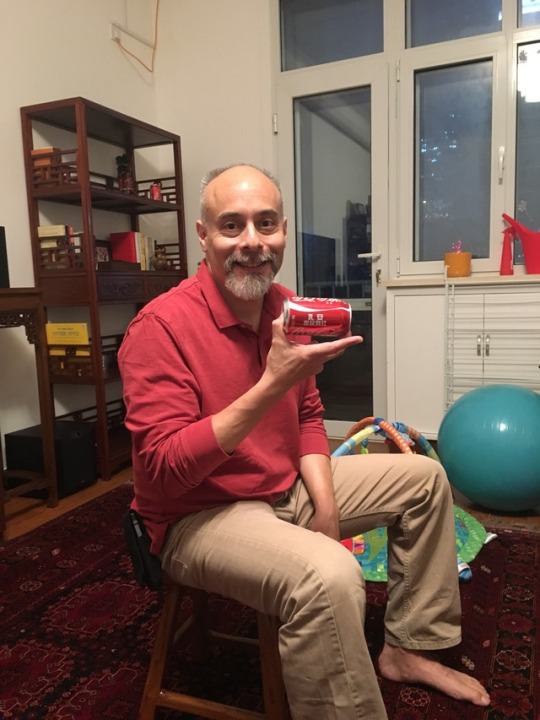
Here in China, our Beijing correspondent Anthony Kuhn is something of a star. His deeply fluent Mandarin and tough questions of government officials at Beijing press conferences have meant his videos get thousands of views on China's YouTube equivalent, Youku. At a recent wedding he attended, the bride and groom had Coke cans personalized for all their guests. Anthony’s says: “National Internet star.”
-Miranda Kennedy, Morning Edition editor
Photo: Miranda Kennedy/NPR
455 notes
·
View notes
Video
The most remote place we have visited on this trip to China is Gujiao - loosely pronounced goo-jow’ - a small city in the mountains a little more than 300 miles southwest of Beijing. It is in a valley that brings the Appalachians to mind. Like many an Appalachian city, Gujiao is long and narrow, spreading for miles along the river between the mountain slopes. Also like many Appalachian cities, Gujiao includes sprawling brick industrial plants and steel mills, some dead and some still operating - and the big historic business is coal. The entrance to one of the underground mines is right on the edge of a densely populated urban neighborhood within the city itself. But China is deliberately producing less coal than in years past, trying to boost alternatives instead. And Gujiao is going through a transition. In a park at the center of town, we discovered Liu Tai Xiang. He’s 55, a former mining engineer who has since retired. He spends some time now as a saxophone teacher, and on Saturday was instructing four students in the park. Coming down a hillside, we heard the notes of what sounded like a very familiar classical Western song. One of the students was learning to play it. We asked if she would play for us; she did not, but Liu Tai Xiang said he would.
-Steve Inskeep, Morning Edition host
Video: Steve Inskeep/NPR
284 notes
·
View notes
Photo
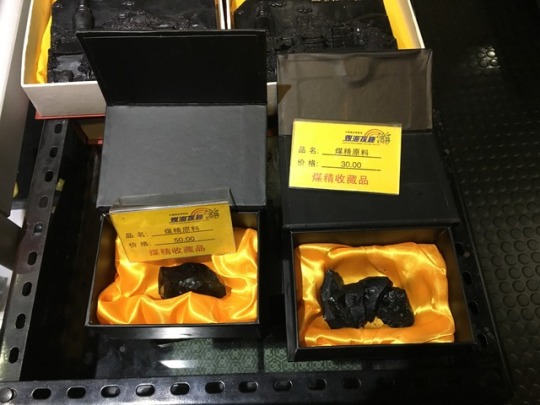
The Chinese government is aggressively pursuing policies to limit China’s production and use of coal, to try to get a handle on the pollution that clogs many of its cities. But coal is still a source of proud nationalism. At the coal museum in Shanxi province, China’s largest coal-producing region, the museum shop sells lumps of coal, carefully set in an orange satin lining inside a gift box. Every child’s nightmare vision of a Christmas present.
-Miranda Kennedy, Morning Edition editor
(Photo: Miranda Kennedy/NPR)
155 notes
·
View notes
Photo
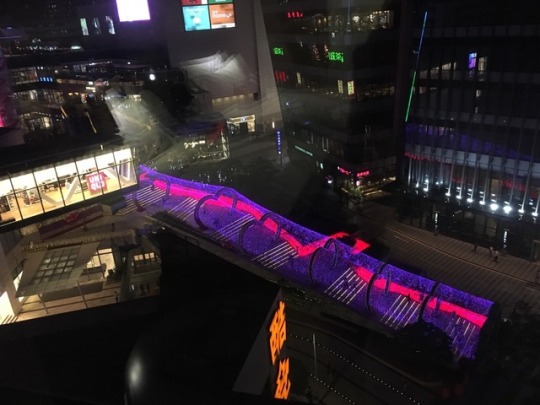
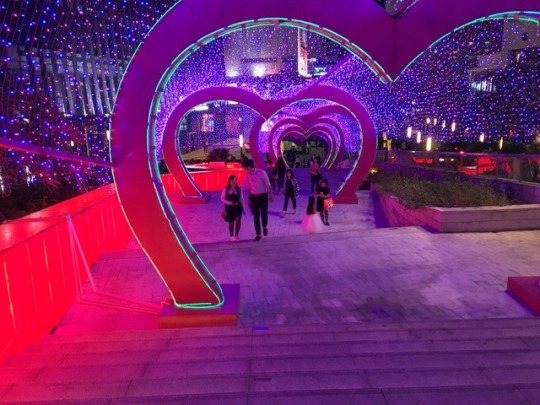
Shenzhen is a balmy southern city that links Hong Kong to China’s mainland. It's known for its high-tech industry parks, and, more importantly, for its malls. This outdoor shopping center is lit up with spectacular lights all evening, including this walkway which really should be called a love tunnel, leading, where else? To a Uniqlo. Right next to an H&M. Last night the mall was full of families with small children and teenagers gawking at a very cute male singer-songwriter, who performed an amplified song set under fireworks-style lights. -Miranda Kennedy, Morning Edition editor (Photos: Miranda Kennedy/NPR)
10 notes
·
View notes
Video
Workers at the BYD factor in Shenzhen, China stream out of work at the end of their shift. For more on BYD, see our previous post.
-Miranda Kennedy, Morning Edition editor
(Video: Alyssa Edes/NPR)
5 notes
·
View notes
Photo
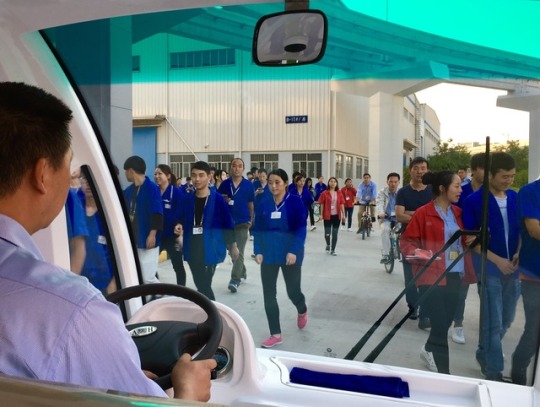
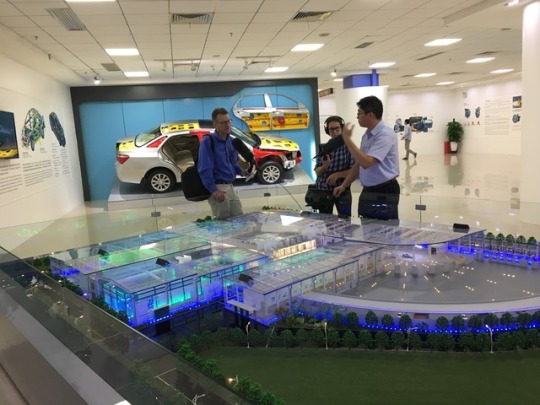
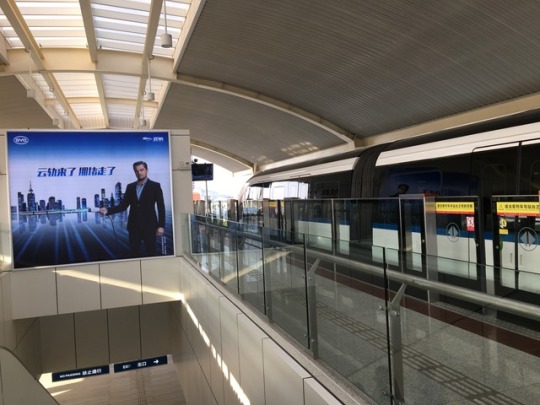
At the BYD factory in Shenzhen, China, line workers stream out at the end of their shift. BYD stands for Build Your Dreams, and the dream it is trying to build is a clean China. These workers—there are over 30,000 of them just at this Shenzhen campus—are manufacturing parts for electric cars, taxis, buses, and solar panels. Most of them will be sold in China, as part of the government’s plan to run the whole country on what they call “new energy vehicles” one day. The debilitating levels of pollution in China’s major cities led the Chinese government to say it wants 20% of its fleet to be electric by 2025. An electric-run China would be good for BYD, which is far from a global brand, although last year it manufactured and sold more electric vehicles than anyone else worldwide, including a fleet of electric buses in Los Angeles. As further evidence of its ambitions—Leonardo Di Caprio is the BYD brand ambassador. In this photo, he shows off BYD’s monorail, China’s first.
-Miranda Kennedy, Morning Edition editor
(Photos: Miranda Kennedy/NPR)
#beijing#npr#cars#energy#electric cars#morning edition#leonardo dicaprio#china#pollution#environment
180 notes
·
View notes
Photo
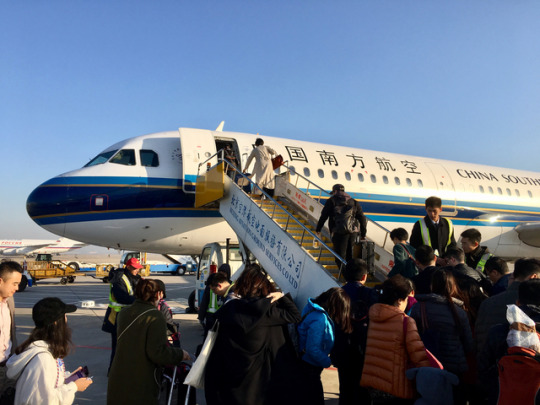
NPR listeners are all over the world! We just flew from Beijing to the southern city of Shenzhen and for the second time here in China, people have asked if we work for NPR.
When we first arrived in Beijing, one listener recognized Morning Edition Host Steve Inskeep and came right up to shake his hand. In Shenzhen, another group saw our bags and asked if we work for NPR. They’re listeners to member station WGUC in Cincinnati. It’s cool to feel the impact of NPR worldwide.
-Alyssa Edes, Morning Edition producer
(Photo: Alyssa Edes/NPR)
165 notes
·
View notes
Video
You get to know a city better when you ride its subway. We returned from an interview in Beijing through its underground. Even for a veteran of the New York subway the system, it’s massive—so many interlocking lines that the subway map looks like a bowl of spaghetti. We changed trains twice and hurtled through many stops and were never near the end of any of them—and a trip of an hour or so through the city’s notorious traffic was cut possibly in half. The system’s epic scale is apparent from the moment you approach a subway entrance: hundreds or even thousands of bikes are parked outside, handlebar to handlebar along the sidewalks, sometimes for blocks. People bike to the subway and descend. Inside the crowded cars, we absorbed constant sensations, including this one: the racing trains project ads into the dark walls of the tunnels, so we could see them through the windows.
-Steve Inskeep, Morning Edition host
(Video: Steve Inskeep/NPR)
14 notes
·
View notes
Photo
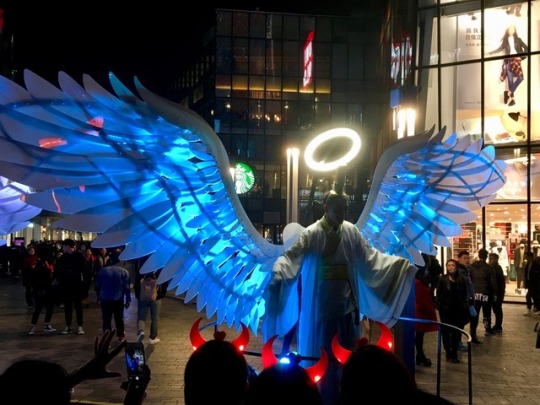
Happy Halloween from Beijing! In the city’s Sanlitun neighborhood near our hotel, dozens of people were dressed up as devils, emperors, and zombies among other things. This giant display of glowing wings attracted a horde of people taking photos of themselves as angels. Minutes after I snapped this, police officers gruffly told the man pictured to move along — apparently because he and his friends were attracting too much attention with their costumes.
-Alyssa Edes
(Photo: Alyssa Edes/NPR)
35 notes
·
View notes
Photo
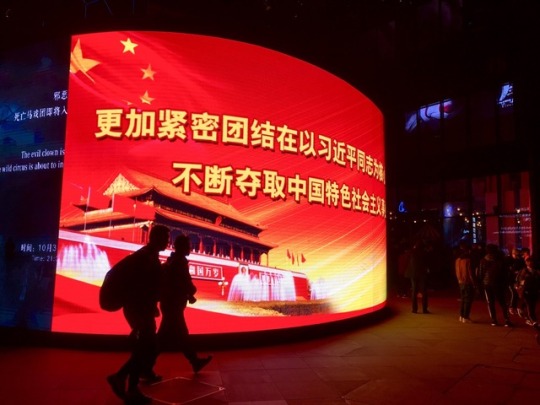
Morning Edition is in China, ahead of President Trump’s arrival next week. Trump will visit China in the dead center of his 12-day, 5-country tour, the longest trip by an American president to Asia in 25 years. We’re here exploring China, the world’s other great superpower, ahead of his visit to try to understand the economic, political, and geostrategic challenges China presents to the U.S. From the western province of Shanxi, China’s coal country, and the industrial megahub of Shenzhen, we’ll look into how China is managing its need for power while still trying to control environmental pollution. We’ll look at how the Chinese government tips the balance in favor of its own electric car companies, and why U.S. companies like Tesla are happy enough to trade that marketing edge for the ability to to manufacture and sell their cars in this, the world’s second-biggest consumer market. How did China become the biggest U.S. competitor on the global stage? What can Trump do to contain China’s soaring economic ambitions, while also keeping China close? After all, no one is more aware than the U.S. of the need for China’s help when it comes to North Korea, the greatest national security threat to the U.S. In the coming weeks we’ll present thoughtful stories and live coverage ahead of and during Trump’s visit to China, featuring the work of co-host Steve Inskeep, Shangai correspondent Rob Schmitz, Beijing correspondent Anthony Kuhn, editor Miranda Kennedy and producer Alyssa Edes.
(Photo: Alyssa Edes/NPR)
60 notes
·
View notes
Photo
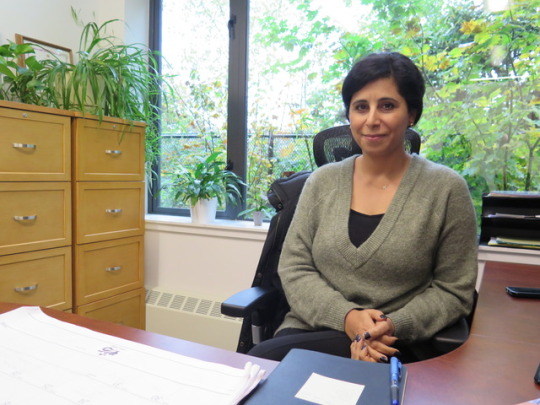
Mona Hassania is the manager of Settlement Orientation Services in B.C. -- a non-governmental organization that helps settle refugees. There has been a huge jump in asylum-seekers coming in from the United States. More than 15-thousand people have crossed into Canada illegally. Hassania says many are fleeing what they say is an unwelcoming climate in the United States. The influx has put a strain on many Canadian services and is an unintended consequence of Canada’s billing itself as a friendlier destination for those fleeing persecution in war-torn nations.
- Lulu
(Photo: Ravenna Koenig/ NPR)
16 notes
·
View notes
Photo
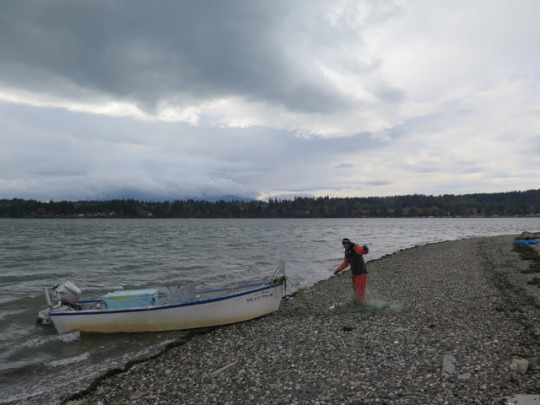
James Ballew -- a fisherman from the Lummi Nation -- prepares his nets before heading out on the water. The Lummi are a Native American tribe whose reservation sits along the Salish Sea in Washington State. They share this waterway with Canada -- and the plans to expand the Trans Mountain Pipeline could mean that oil tanker traffic in the area would increase sevenfold. The Lummi have formed an alliance with First Nation communities inside Canada to oppose it. It’s the most recent sign of increased co-operation and activism among indigenous groups that are working to stop these kinds of projects.
Jay Julius is a fisherman and elected council member for the Lummi Nation. He says, "A pipeline leak, an oil spill knows nothing about boundaries. It has no idea when it's entering or about to leave a reservation. It has no idea when it's about to cross the Canadian border... so when a spill happens up there, it's going to impact us severely."
- Lulu
(Photo: Ian Stewart/NPR)
28 notes
·
View notes
Photo
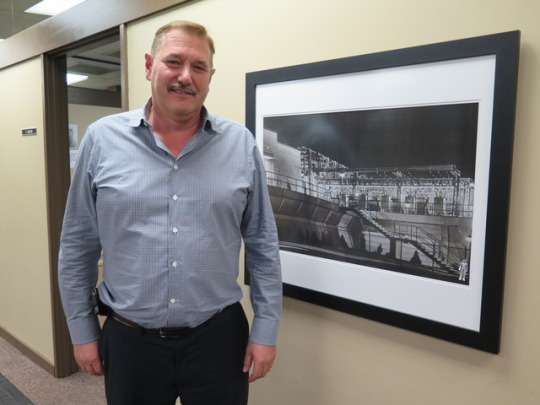
Graham Trafford is the General Manager and part owner of Mott Electric in Burnaby, B.C. – they’re an electrical contracting company that does service work and construction. We spoke to Trafford about Mott Electric’s support for expansion of the Trans Mountain Pipeline in the province that would help get Alberta tar sands across the Pacific to expanding markets in Asia. His company hopes to get a contract for that project – which is a controversial one in B.C. and neighboring Washington State. But we also asked him about the part of the Canadian-US relationship that’s been taking up the most space in newspaper headlines these days: the North America Free Trade Agreement (NAFTA). Almost 80 percent of Canada’s exports go to the United States. “I guess with any trade agreement, if one party comes away and they’re really happy, then it’s not a good agreement… Right now I know there’s lots of people that aren’t very happy, and I’m not sure where it’s all going to end up. I think there’s a lot of posturing going on - on all sides.” Trafford thinks the trade agreement is valuable though, especially for resolving conflict between companies: “At the end of the day, if there’s a problem, how are you going to fix it? Are you going to have a messy divorce or you going to have an agreement that everybody can walk away… knowing that it’s going to be solved – maybe not to everyone’s satisfaction – but it’s going to be solved.”
- Ravenna
3 notes
·
View notes
Photo
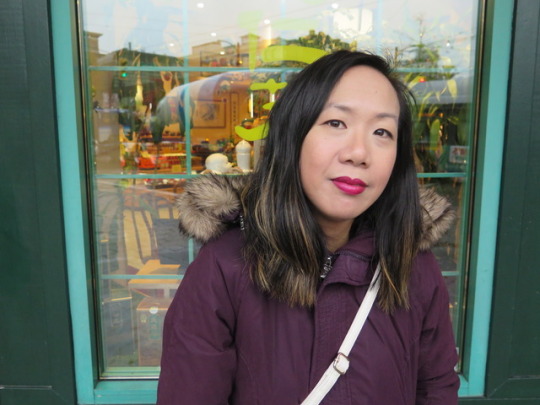
Jen Sookfong Lee is a Vancouver novelist whose grandfather immigrated to this city from China in the early 1900s. Lee’s writing has centered on the Vancouver area and the experiences of its Asian minority groups -- a demographic that makes up some 43% of the population.
We spoke to Lee in a tea shop in Chinatown that used to be her grandfather’s barbershop. She told us about some of the discrimination he faced in the early 20th century -- how white supremacists went through the neighborhood breaking windows and beating up Asian men. It’s not the kind of thing that Lee ever saw growing up, but she’s been deeply disturbed by some of the anti-Asian rhetoric that she’s seen in Vancouver since the election of Donald Trump. White supremacist groups have tried to rally in this city, emulating what has taken place in some places in America, albeit with little success.
She says that Canadians are aware and concerned about the deep divisions in the United States.
“Now there’s a lot of us feeling like oh thank god that we’re not you guys. Because it feels really scary and weird and awful. And I think as a sort of reaction to that, a lot of people are turning inward to Canadian culture at this point… a lot of people are not traveling to the states, a lot of people are trying not to consume American culture; they’re trying to read Canadian books or watch Canadian TV shows. It’s a thing.”
- Ravenna + Lulu
(Photo: NPR/Ian Stewart)
205 notes
·
View notes
Photo
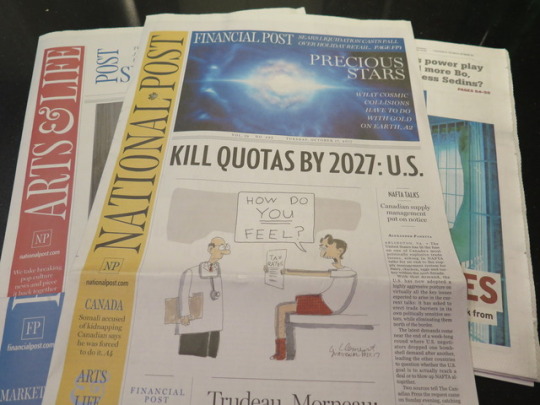
This is the front page of Canada’s National Post newspaper where the headline news is all about NAFTA -- the North America Free Trade Agreement. It’s a sign of how seriously our neighbor to the north is taking negotiations. These most recent round of talks ended on Tuesday with little accomplished and much worry about the future of the trade pact. President Trump has called NAFTA “the worst trade deal ever signed” but it is seen as vital to many communities in the United States, Mexico and Canada.
This week we are in the city of Vancouver, British Columbia in Canada to look at NAFTA, oil pipelines and immigration.
Join us -- Lulu Garcia-Navarro, host of Weekend Edition, and producers Ravenna Koenig and Ian Stewart -- as we report on our northern border on the issues that bind our two countries together but are also pushing them apart.
-- Lulu
171 notes
·
View notes
Photo
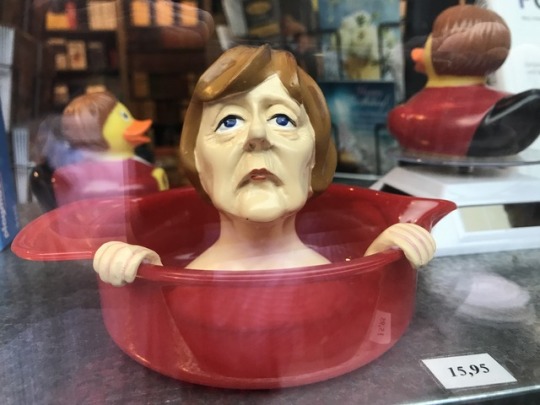
On the morning after the German elections you can get a Angela Merkel cream dispenser for a swell price. - Barry Gordemer, Morning Edition producer
12 notes
·
View notes
Photo
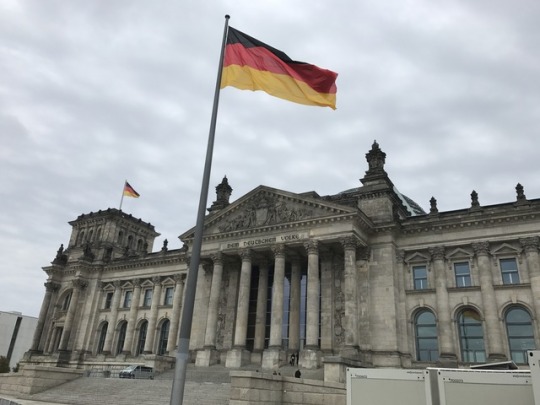
On the eve of elections, the German flag flies over the Bundestag, Germany’s parliament. Voters decide Sunday who will occupy this building. Morning Edition will have the results live from Berlin Monday.
- photo by Barry Gordemer, Morning Edition producer.
22 notes
·
View notes